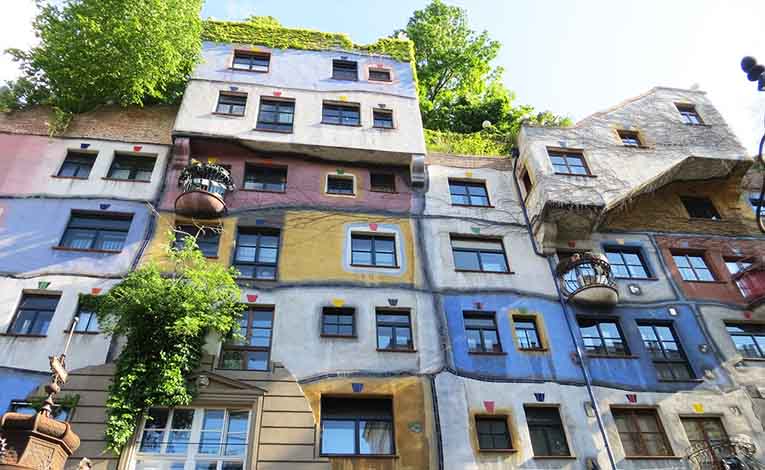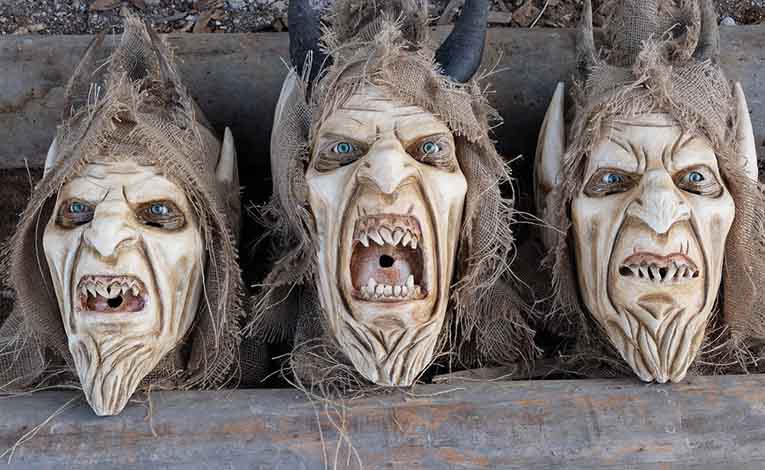Though it’s known for its thriving art scene, opera houses, theatres, museums, and palaces, the magnificent city of Vienna even offers much more than that. Sipping hot chocolate with the snow-capped Alps in the background, and skiing down some of the best slopes in the world, those are a given. But what about the hidden gems of Vienna? You can have your hot chocolate and drink it too in this beautiful city.
While you’re studying abroad in Vienna, after you hit the castles and the operas, try out these five slightly off-the-beaten-path attractions:

The visually entrancing Hundertwasser House in Vienna.
1. Hundertwasser House
This architectural highlight seems like a whimsical painting come to life in front of your eyes. Built from 1983-1985, Hundertwasserhaus is an apartment building designed by Friedensreich Hundertwasser, a famed Austrian painter. He was given complete free reign in the design of the house, and his style is loud and clear. Hundertwasser was known for bold colors, swirling designs, and incorporating naturally-occurring items into the architecture, including trees growing right inside the apartments, and a grass-covered roof. Anyone studying abroad in Vienna for architecture or design should make Hundertwasserhaus a mandatory visit. The building is used as residence, so visitors should stop in the Kunst and Café coffeehouse located on the ground floor. The shop shows a free film, in which the artist himself leads viewers on a tour of the building.
2. The Republic of Kugelmugel
This unique spherical house is a republic of its own, all within the city limits. Austrian Artist Edwin Lipburger decided to sever his ties with the country after having trouble with the authorities over building permits. His roundhouse design was quite literally not making the cut, so he built it on a hillside in 1985 hoping to avoid regulations. Kugelmugel, which means sphere bump, was eventually moved into an Austrian park and is now an interesting stop. Lipburger even went as far as to name himself the ruler of hundreds of imaginary civilians of his micronation, refused to pay taxes, and and printed his own stamp (which almost bought him some him jail time).
3. Taborstrasse
This is a less-explored district of Vienna. It is also known as the Jewish District or Matzoh Island, and is known for its lovely and distinctive character. The area is located right in the heart of the city and really is almost an island, as it’s encircled by the Danube and Danube Canal. The district itself offers a plethora of unique shops and markets but it also home to other attractions, such as the practice location of the famous Vienna Boys Choir, and the widely acclaimed Augarten Porcelain Factory.

Krampus in Vienna, Austria
4. Krampus Walk
This one isn’t just off the beaten path — it takes the streets by storm! Krampus, the “anti-Santa,” is a demonic figure that comes to visit every 5th of December. He is said to have originally been a companion of Santa but relations must have gone a little awry because now the snarling, monstrous figure carries chains and is the tormentor of young and old alike. If you’re spending the fall semester in Vienna, know that the celebrations tend to be much elaborate in more rural areas, but the hairy and horned creature can still be found on the eve of Saint Nicholas Day within Viennese streets.
5. Tiergarten Schoenbrunn
Having a zoo is not that unusual but having the world’s oldest zoo is. Vienna’s zoo was originally built in 1752 by the empress Maria Theresia and her husband. The original 12 structures were built in a year, then the animals were moved in and unveiled to the public. The zoo is built around an octagonal pavilion that was designed and used for imperial breakfasts. Visitors can still enjoy a break at the restaurant and café inside. Many other baroque-style structures remain intact and in excellent condition.







